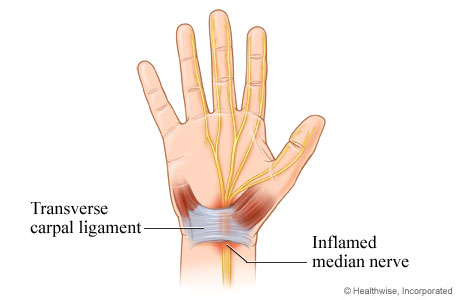Carpal Tunnel Syndrome
What is carpal tunnel syndrome?
Carpal tunnel syndrome is numbness, tingling, weakness, and other problems in your hand because of pressure on the median nerve in your wrist.
The median nerve and several tendons run from your forearm to your hand. They pass through a small space in your wrist called the carpal tunnel. The median nerve controls movement and feeling in your thumb and first three fingers. It doesn't control movement of your little finger.
Symptoms
Carpal tunnel syndrome

The carpal tunnel is a narrow space in the wrist. It contains wrist bones and a ligament (transverse carpal ligament) across the wrist where the palm and forearm meet. Tendons and the median nerve pass through this space to your hand. The median nerve supplies feeling and some movement to part of the hand.
Carpal tunnel syndrome is usually caused when a health condition or problem makes the carpal tunnel space too small. This puts pressure on the median nerve and causes pain, tingling, and other symptoms.
What are the symptoms of carpal tunnel syndrome?
Carpal tunnel syndrome can cause tingling, numbness, weakness, or pain. Mild carpal tunnel symptoms most often affect the hand and sometimes the forearm. But they can spread up to the shoulder. You may first notice symptoms at night. Or you may notice stiffness in your fingers in the morning. You may be able to get relief by shaking your hand.
With moderate or severe symptoms, you may have numbness or reduced strength and grip in your fingers, thumb, or hand. For example, you may have a hard time holding a fork or opening a jar.
Symptoms most often occur in the thumb, index finger, middle finger, and half of the ring finger. If you have problems with your other fingers but your little finger is fine, this may be a sign that you have carpal tunnel syndrome. This is because the nerve involved in carpal tunnel syndrome doesn't affect the little finger.
Diagnosis
How is carpal tunnel syndrome diagnosed?
To diagnose carpal tunnel syndrome, your doctor will ask if you have any health problems, such as arthritis, hypothyroidism, or diabetes. The doctor may ask if you are pregnant. The doctor will ask if you recently hurt your wrist, arm, or neck. Your doctor will want to know about your daily routine and any recent activities that could have hurt your wrist.
During the exam, your doctor will check the feeling, strength, and appearance of your neck, shoulders, arms, wrists, and hands. The doctor may suggest having tests, such as:
- Nerve testing to check the median nerve.
- An ultrasound to look at the size of the median nerve.
- An MRI to find out what is putting pressure on the median nerve.
- Blood tests to check for a thyroid problem, rheumatoid arthritis, or other conditions.
Prevention
Carpal Tunnel Syndrome: A Few Tips for Preventing It
Treatment
How is carpal tunnel syndrome treated?
Treatment for carpal tunnel syndrome is based on how serious it is, if there is any nerve damage, and if other treatment has helped.
If your symptoms are mild, home treatment for 1 to 2 weeks is likely to relieve your symptoms. Try these tips.
- Wear a wrist splint.
- Stop or change activities that cause numbness and pain.
- Ice your wrist.
- Try nonsteroidal anti-inflammatory drugs (NSAIDs) for pain.
Corticosteroids may treat the swelling of the nerve and your pain. They can be taken in pill form or injected into the wrist by a doctor. Physical therapy or occupational therapy is sometimes used.
Surgery is an option. But it's mostly used only when symptoms are so bad that you can't work or do other things even after several weeks to months of other treatment.
The sooner you start treatment, the better your chances are to stop symptoms and prevent long-term damage to the nerve.
Copyrighted material adapted with permission from Healthwise, Incorporated. This information does not replace the advice of a doctor.
